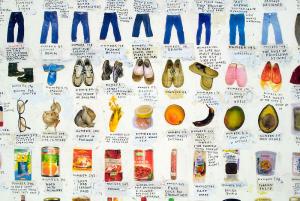Last week, I helped a woman who is moving from a very large house (probably over 3000 square feet) to a three-bedroom apartment.
We sorted the contents of her garage into piles of garbage, piles of recycling, piles of donations, and piles of things to keep. Some things were easy to sort: the bags of trash that had been sitting for weeks; the broken picture frame; the dented metal garbage can; the bags of clothes that no longer fit.
Some things were not so easy: the dollhouse that needed a few touch-ups but still had many hours of good Barbie time left in it; the unused $600 ski rack; the deflated soccer ball.
It was not my stuff, so it was easy for me to be objective. I had no emotional attachment to any of it, no history, no story, no memories lacquering the surfaces of these objects.
They were just things.
If I were to sort the contents of my own garage, I might not have such an easy time. We humans have a touch of the squirrel in us, a touch of the magpie. A response of “Oh! Pretty!” A desire to own and consume. We place an emotional value on things. With a nod to Tim O’Brien, some of us carry peaches in heavy syrup when we’re slashing our way through a war zone.
It doesn’t make a lot of sense, does it?
In contrast, others carry very little at all, preferring to live a Thoreau-like deliberate existence. A guy named Dave created the 100-Thing Challenge, the goal of which is to “live a life of simplicity, characterized by joyfulness and thoughtfulness.”
He explains that so many of us feel “stuck in stuff” and the way to get unstuck is to reduce (getting rid of stuff), refuse (to get more stuff), and rejigger (your priorities).
 The artist Simon Evans created a personal inventory cataloguing everything he owns. Sometimes, we need a proper inventory to see what’s what.
The artist Simon Evans created a personal inventory cataloguing everything he owns. Sometimes, we need a proper inventory to see what’s what.
I fear I would brilliantly fail the 100-Thing Challenge. I suspect I have more than 100 things just in the drawers of my desk, and if I were to create a visual personal inventory, it definitely wouldn’t fit on one poster.
You know where I’m going with this, don’t you?
We writers collect words. We drape our stories with them, roll ourselves up in them, and swing them around until our worlds are filled with them. We say, “Oh! Pretty!” and hang onto them. We are unable to see that many of these words, while perfectly serviceable, do not fit our need.
As I approach revising my current manuscript, I’m trying to become a revisionary. I’m trying to see what’s there, to see what’s necessary and what’s not. It’s hard to be objective about the verbal stuff hanging out in my manuscript file-garage.
When I get to the end—when I get to what’s left behind—I’m hoping I’ll be left with what really matters. I’m hoping I’ll be left with an economy of words that are deliberate and that sing. That’s becoming revisionary.
Originally published at Quirk and Quill 1.21.13
Comments
Post a Comment